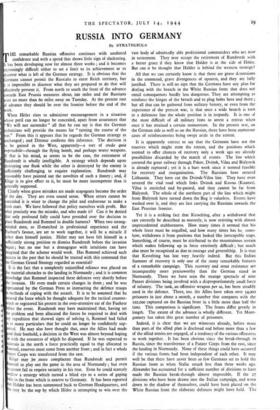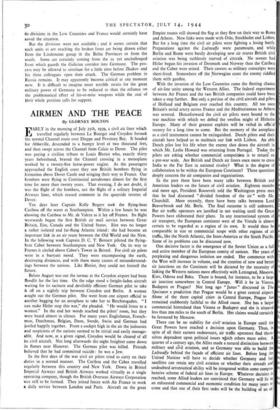RUSSIA INTO GERMANY
By STRATEG IC US
HE remarkable Russian offensive continues with unabated confidence and with a speed that shows little sign of slackening. has been developing now for almost. three weeks ; and it becomes ncreasingly difficult either to set a limit to its achievement or to scover what is left of the German strategy. It is obvious that the ermans cannot permit the Russians to enter Reich territory, but
t is impossible to discover what they are prepared to do that will ffectively prevent it. From north to south the front of the advance
owards East Prussia measures about. zoo miles and the Russians vere no more than 6o miles away on Tuesday. At the present rate f advance they should be over the frontier before the end of the eek.
When Hitler rises to administer encouragement in a situation hose peril can no longer be concealed, apart from assurances that 'We will not surrender" all that he can say is that the German echnicians will provide the means for "turning the course of the Ir." From this it appears that he regards the German strategy as nchanged ; and Dittmar confirms this inference. The decision is
o be gained in the West; apparently—a sort of credo quia nzpossibile—through the flying bomb, and perhaps worse weapons.
I that is his mind, as seems to be the case, the retirement of undstedt is wholly intelligible. A strategy which depends upon estroying one flank while the other is destroyed by the enemy is ufficiently challenging to require explanation. Rundstedt may easonably have pointed out the novelties of such a theory ; and, if huge is to give effect to it, he must be more incompetent than is enerally supposed.
Clearly when grave mistakes are made scapegoats become the order f the day. They are even sound sense. When errors cannot be oncealed it is wiser to change the pilot and endeavour to make a resh start. We have followed that policy ourselves with profit. But hat precisely was the mistake, and who made it? Can it be denied hat only profound folly could have presided over the decision to Lace Rundstedt and Rommel in double harness? When two strong- inded men, so ill-matched in professional experience and the uehrer's favour, are set to work together, it will be a miracle if ither does himself justice. Hitler may not have felt himself in a ufficiently strong position to dismiss Rundstedt before the invasion gan ; but no one but a demagogue with intuitions can have agined that the scheme would work. Has Rommel achieved such uccess in the past that he should be trusted with this command that he German Grand Strategy regarded as essential?
It is the fact that a completely unjustified reliance was placed on he material obstacles to the landing in Normandy ; and it is common
owledge that Rommel inspected these defences very shortly before e invasion. He even made certain changes in them ; and he was presented by the German Press as instructing the defence troops methods of coping with the assault. It is to be assumed that he
ured the force which he thought adequate for the tactical counter- tack or registered his protest in the over-attentive ear of the Fuehrer dote the event. Rundstedt may have maintained that, having set e problem and been allocated the forces he required to deal with nv expedition that showed signs of solving it, Rommel had failed so many particulars that he could no longer be confidently sup- rted. He may also have thought that, once the Allies had made ood their foothold, a decision in the West was almost beyond hoping or with the resources of which he. disposed. If he was expected to intain in the north a force practically equal to that allocated to ommel, reserves must come from another front ; and in fact a whole anzer Corps was transferred from the east.
Kluge may be ,more complacent than Rundstedt and permit mmel to play out the game in the area of Normandy ; but even e cannot fail to require security in his rear. Even he could scarcely wallow a strategy which turned a blind eye to a series of gaping es in the front which is nearest to Germany. It has been reported
t Haider has been summoned back to German Headquarters, and ts may be the sop by which Hitler is attempting to win over the vast body of admittedly able professional commanders who are now in retirement. They may accept the retirement of Rundstedt with a better grace if they know that Halder is at the side of Hitler. But can it be thought that Halder is behind the western strategy?
All that we can certainly know is that there are grave dissensions in the command, grave divergences of opinion, and they are fully justified. There is still no sign that the Germans have any plan for dealing with the breach in the White Russian front that does not entail consequences hardly less dangerous. They are attempting to reinforce the hinges of the breach and to plug holes here and there ; but all that can be gathered from military history, or even from the experience of the presmt war, is that once a wide breach is torn in a defensive line the whole position is in jeopardy. It is one of the most difficult of all military feats to arrest a retreat when once it has attained a certain momentum. In the present war, on the German side as well as on the Russian, there have been numerour cases of reinforcements being swept aside in the retreat.
It is apparently correct to say that the Germans have not the reserves which might stem the retreat, and the positions which seemed to offer chances of recovery only a week ago are already possibilities discarded by the march of events. The line which covered the great railway through Pskov, Dvinsk, Vilna and Bialystok is already ruptured ; yet it is a bare week since it seemed feasible for recovery and reorganisation. The Russians have entered Lithuania. They have cut the Dvinsk-Vilna line. They have even severed the vital road which links Dvinsk and Kovno (Kaunas). Vilna is encircled and by-passed, and they cannot be far from Bialystok. The whole of the northern part of the line which might from Bialystok have turned down the Bug is valueless. Events have washed over it, and they are fast carrying the Russians towards the East Prussian frontier.
Yet it is a striking fact that Kesselring, after a withdrawal that can correctly be described as masterly, is now resisting with almost unprecedented stubbornness. How many times it seemed that his whole force must be engulfed, and how many times has he, some- how, withdrawn it from positions that looked like inescapable traps. Something, of course, must be attributed to the mountainous terrain which makes following up in force extremely difficult ; but much also must be recognised as due to courage and generalship. It is true that Kesselring has lost very , heavily indeed. But this Indian Summer of recovery is only one of the many remarkable features of a remarkable campaign. This recovery and stout resistance are incomparably more praiseworthy than the German stand in Normandy. There we have seen the strange spectacle of nine Panzer divisions being involved with a disproportionately small force of infantry. The tank, an offensive weapon per se, has been steadily used in the defence. There, too, the Allies have taken over 54,000 prisoners in just about a month, a number that compares with the 102,000 captured on the Russian front in a little more than half the time. This comparison is significant. The fronts differ greatly in length. The extent of the advance is wholly different. Yet Mont- gomery has taken this great number of prisoners.
Indeed, it is clear that we are witnesses already, before more than part.of the allied plan is disclosed and before more than a few of the allied armies are engaged, of a tendency of the various offensives to work together. It has been obvious since the break-through in Russia, since the transference of a Panzer Corps from the east, since the landing in Normandy. None of these things could have occurred if the various fronts had been independent of each other. It may well be that there have never been so few Germans set to hold the Russian front as when Stalin struck less than three weeks ago. Alexander has accounted for a sufficient number of divisions to have made the Russian break-through almost impossible. If the 27 divisions who have been drawn into the Italian campaign, and worn down to the shadow of themselves, could have been placed on the White Russian front the elaborate defences might have held. The 6o divisions in the Low Countries and France would certainly have saved the situation.
But the divisions were not available ; and it seems certain that such units as are reaching the broken front are being drawn either from the Lindemann group in the Baltic Provinces or from the south. Some are certainly coming from the as yet unchallenged- front which guards the Galician corridor into Germany. The pro- cess may be allowed to continue for a little time before Zkukov and his three colleagues open their attack. The German problem in Russia remains. It may apparently become critical at any moment now. It is difficult to imagine more terrible straits for the great military power of Germany to be reduced to than the reliance on the problematical effect of hit-or-miss weapons while the rear of their whole position calls for support.



























 Previous page
Previous page